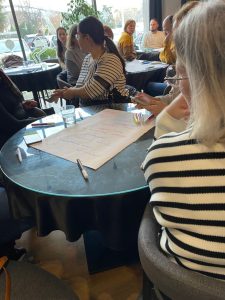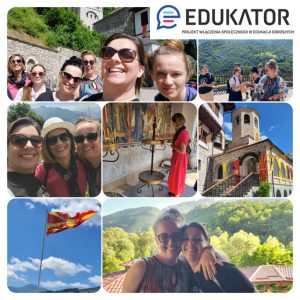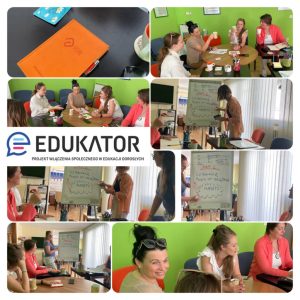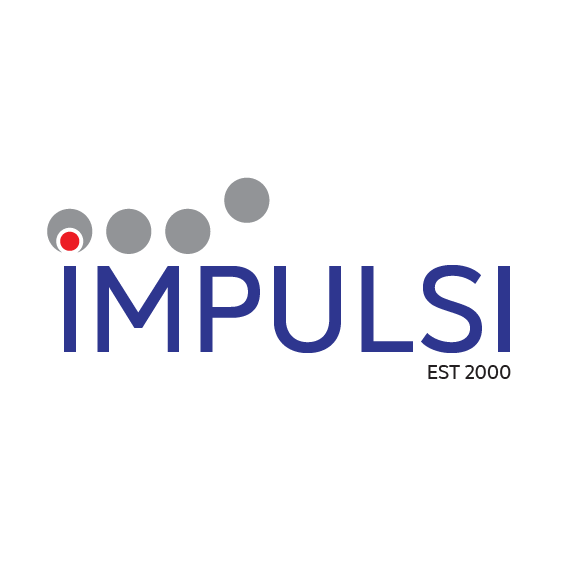Beginning 2023 we joined the project! The leader from Poland – Foundation Education Development and Innovation and Irish partner EDUSMART Training Centre Limited have been cooperating for more than 1 year under this project. They have prepared already some reports – please see the report in English: https://www.feri.org.pl/pliki/EDUKATOR/RAPORT_EDUKATOR_2022_EN.pdf
IMPULSI started cooperation within task 2 which is educational materials. Task 2, resulting from the work conducted in partner countries and international meetings, has been ultimately determined as follows:
- EDUCATOR MATERIALS, including specifically for individuals with fewer opportunities
- DEVELOPMENT OF MATERIALS
The materials will be prepared based on the best standards. They will also take into account the specifics of adult learning and their needs.
Each module will include three elements:
- APPROACHES TO REACHING ADULTS WITH FEWER OPPORTUNITIES
- METHODS AND TECHNIQUES OF WORKING WITH ADULTS WITH FEWER OPPORTUNITIES
- MOTIVATIONAL TOOLS FOR ADULTS WITH FEWER OPPORTUNITIES TO ENGAGE IN LIFELONG LEARNING
MODULE THEMES DEVELOPED BY PARTNERS:
- ADULTS’ CONCENTRATION – conscious development of concentration. We are increasingly affected by scattered thoughts, information overload, and information chaos in the world. It becomes more difficult for us to focus our attention and absorb new information. Concentration is the ability to focus and sustain attention on specific tasks. It is necessary for all kinds of conscious actions. It enables us to direct our attention, perceive and do what is important to us at any given moment. It is essential in both professional and personal life. It applies to performing professional tasks, setting new goals, as well as everyday activities. Concentration can also touch upon areas of mindfulness, prioritization, logical thinking, analysis, analytical thinking, information search, and information selection. These are important competency areas for adults.
- ABILITY TO DEVELOP TRAINING USING AVAILABLE APPLICATIONS AND ONLINE TOOLS
Every trainer wishing to conduct training and being an active trainer should keep up with new trends and be “close” to and responsive to the group’s needs and target training users. The aim of the module is to prepare tools and guidelines from various applications and online programs that trainers can use to plan and design training/workshops/courses for adults, including those with fewer opportunities. The goal is to enable trainers to independently plan and implement training from A to Z in any situation or location without relying on technical or logistical support from training companies. The module should include applications and examples of tools for:
- a) Participant recruitment
- b) Participant communication/contact
- c) Preparation of presentations and training materials
- d) Training evaluation
- e) Preparation of training certificates
- f) Assigning tasks during and after training
- NEW COLLABORATION – a model of group dynamics
Similar to concentration, the ability to ENGAGE participants in the group process is crucial for trainers. This will lead to the most beneficial outcomes for the participants. To achieve this, techniques, tools, and sample programs/exercises should be provided to help focus participants’ attention during training and build their engagement throughout and, if possible, even after the training. It should also cover the dynamics of group processes and understanding the changing needs of the group. Collaboration within a group can take various forms, but it is important for the trainer’s exercises and skills to influence group engagement, attention focus, synergy, and a pleasant atmosphere. This aspect is particularly significant in groups of individuals with fewer opportunities, where trainers often encounter barriers to entry, group concerns, insecurities, and mistrust.
That is our challenge for 2023!
Read more insights in this comprehensive interview:
New partner and new Macedonian experiences „Educator as a pillar of social inclusion in adult education”
Concentration in the Learning Process of Adults
Concentration is the ability to direct and control one’s attention to a specific subject. A person with a high ability to concentrate can easily ignore outside stimuli to focus on the task at hand. Concentration reduces the probability of getting distracted and pulling out from a task. Furthermore, concentration also means being able to focus on one task at a time, rather than losing attention and jumping between task, without finishing any. Concentration can include short bursts or longer periods of focus. According to Harvard University, studies of classroom performance place the focus period of anywhere between 10 to 52 minutes, while other studies suggest no longer than 90 minutes before needing a break.
READ MORE
We developed a DECALOGUE for educators working with adults disadvantages
Impulsi, as partner in Erasmus+ project Educator as a pillar of social inclusion in #adulteducation held a workshop to present the developed training materials for educators of disadvantaged groups of people that are uploaded on an online platform. The event took place on December 5th 2023 with participants from most relevant NGOs, Institutions and Trainers supporting the target group of the project. We are grateful to all for the active participation, input and feedback.




Educators working with adults in disadvantaged situations play a crucial role in fostering empowerment, skill development, and positive change within marginalized communities. The challenges faced by adults in such situations are multifaceted, ranging from limited access to education and employment opportunities to social and economic disparities. In order to effectively address these challenges, educators must possess a specific set of competences that go beyond traditional teaching skills. The Erasmus+ project “Educator – a pillar of social inclusion in adult education”, No.: 2021-1-PL01-KA220-ADU-000035239 developed materials for educators that are working or will work with disadvantaged groups of people focusing on development of their key competences addressing the target group. You can find some of the crucial competencies on #EPALE For the ones that are dedicated and inspired, we are inviting you to use our materials placed on: feriplatform.org.pl
Article on EPALE – EDUKATOR of disadvantaged groups of Adults
EPALE article on Basic rules of Adult learning and 5-5-5 rule




